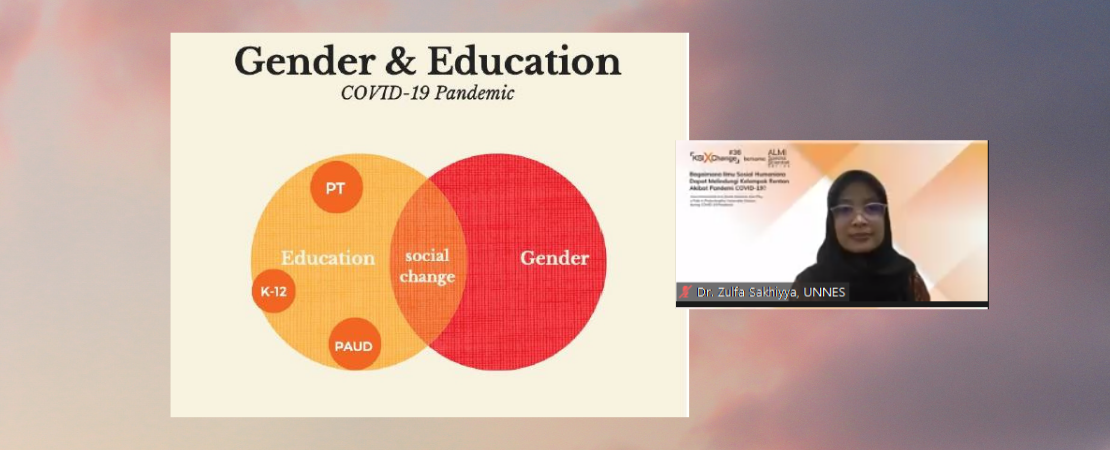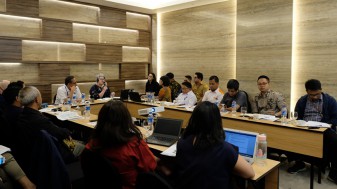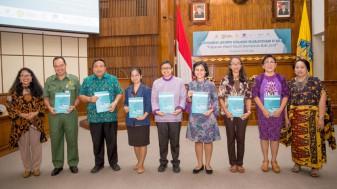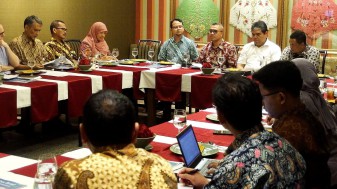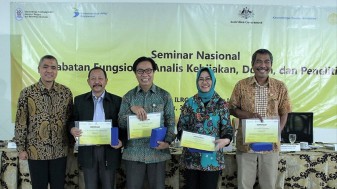The pandemic continues to add to women’s vulnerability in the education sector. Efforts to address this vulnerability need the cooperation of multi-parties, by prioritising a multi-disciplined approach.
This was the presentation topic from Zulfa Sakhiyya, a researcher from the State University of Semarang (Universitas Negeri Semarang) at the KSIxChange#36 event: ALMI Special Scientist Series, on Tuesday 21 September. The forum, ‘How Social and Humanities Science Can Protect Vulnerable Groups from the Impact of the COVID-19 Pandemic’, was held by the Knowledge Sector Initiative (KSI), in collaboration with the Indonesian Young Academy of Science (ALMI).
This forum was attended by speakers who presented the situation of vulnerable groups in Indonesia. In addition to Zulfa, other speakers included an art and culture researcher from the State University of Jakarta (Universitas Negeri Jakarta), Aprina Murwanti, the Executive Director of Sajogyo Institute, Maksum Syam, a social, cultural and religious science researcher from the National Research and Innovation Agency (BRIN), Najib Burhani, an economic researcher from the University of Indonesia, Teguh Dartanto, and a health researcher from Hasannudin University (Universitas Hasannudin), Sudirman Nasir. Inaya Rakhmani and Evi Eliyanah from ALMI moderated the discussion. This event was broadcast on The Conversation Indonesia’s YouTube channel and was equipped with English and Bahasa Indonesia interpreters, as well as sign language interpreters.
Zulfa, who has devoted her attention to educational issues, uses a gender perspective to study the impacts of the pandemic. More specifically, her presentation formulated one huge question: How does the pandemic impact women in the education sector?
“The pandemic makes existing gaps even clearer. It is like a magnifying glass that makes us understand various inequalities in various aspects, including gender,” she explained.
Different contexts, different problems
Zulfa’s presentation summarised several research and case studies on the impact of the pandemic on women at various educational levels, starting from Early Childhood Education (PAUD), to K-12 and higher education. The pandemic’s impact on women in each of these educational levels is quite specific and unique, “considering that certain situations have become a problem even before the pandemic hit”.
At the PAUD level, Zulfa said feminisation was significantly felt. This is because early childhood education is considered an extension of a mothers’ role at home. “The impact is mobilisation of women as PAUD teachers. This is proven by the high percentage of female PAUD teachers in Indonesia, reaching 90-95 percent,” Zulfa said.
The problem is, these women are working with minimal compensation and protection. “Many of them work at below Minimum Regional Salary (UMR) or even with the spirit of volunteerism,” Zulfa explained.
The situation gets worse when these teachers must transform their learning activities from face-to-face to online learning, and even more so as the characteristics of PAUD learning are more focused on the development of children’s psychomotor skills. “It becomes difficult when our digital infrastructure and skills are not evenly distributed,” Zulfa said. “The immediate effect is that many PAUDs stop their learning activities, deactivating and even firing their teachers. This is especially true for PAUDs managed by communities and the private sector,” she added.
At the K-12 education level, or primary to senior high school, female students are more vulnerable. The dropout rate for female students increased, and this was followed by an increase in child marriage cases. This aligns with findings from the National Commission for Indonesian Women and Children, which states that the child marriage rate increased up to 300 percent during the pandemic. Marriage, especially for girls, is often considered an option for parents to reduce the cost of living.
“Underage child marriage actually takes away their rights for education and closes their potential for self-actualisation, which has long-term impacts such as high maternal mortality, stunting, divorce and domestic violence,” Zulfa said.
In the higher education sector, female lecturers suffer from vulnerability. Productivity decreases as private and public space blurs when their work shifts to working from home.
“The duties and obligation as mothers, wives and lecturers all blur into one. The domestic burden becomes an additional weight after the public burden,” explained Zulfa.
This situation brings various excesses, starting from its impact on mental health to reduced time because it is being spent on learning the transition from face-to-face to online. In addition, various administrative tasks for female lecturers in charge of certain positions on campus further add to their load. “Sixty-three percent of participants in research claim there is no time left to write and publish, because their time, energy and mind are devoted to these aforementioned burdens, when in fact academic productivity is the key to improving the quality of lecturers,” she added.
The role of multi-parties
Zulfa said there needed to be cooperation across sectors to address issues facing women in the education world during the pandemic. “This is an important issue worthy of social intervention,” she explained.
In the case of PAUD teachers, for example, legal protection and social insurance for PAUD teachers could be the solution. Accelerating the ratification of the Sexual Violence Eradication Bill (RUU-PKS) could be a solution to overcoming high child marriage rates. Meanwhile, to address issues facing female lecturers at the higher education level, administrative policies need to be integrated with other policies, including by giving incentives.
Zulfa underlined that efforts to examine the pandemic’s impact on vulnerable groups needed to use more than one perspective. It is at this point that social humanities science plays a crucial role, and provides an in-depth understanding of vulnerable groups’ needs, to prevent them from being further marginalised.
The COVID-19 pandemic is a multi-dimensional crisis that needs to be responded to by various parties with multi-disciplinary collaboration, using an inclusive approach and clear partiality to vulnerable groups. “There is intersectionality, and a combination of social identities linked to each other, such as gender, age, work and social class. Examining this crossing can help to find good solutions,” Zulfa said in closing.

